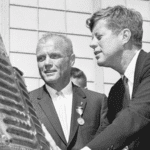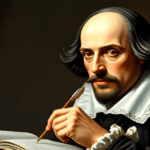William Shakespeare, often celebrated as the most prominent figures in English literature, made an indelible mark on the evolution of the English language. Born in 1564 amidst the Renaissance, a period of profound change and creativity, he contributed significantly to the literary and linguistic landscape of his time. The English language during Shakespeare’s lifetime was characterized by a rich tapestry of influences, including Latin, French, and the regional dialects of England. This linguistic milieu provided a fertile ground for Shakespeare’s innovative use of language.
Shakespeare’s works, consisting of plays, sonnets, and poems, are a testament to his exceptional ability to play with words and craft vivid imagery. His unique style not only reflected the evolving nature of English but also propelled it forward. His creative genius enabled him to manipulate the language to express complex emotions, social commentary, and intricate narratives. By combining existing words in novel ways and introducing entirely new terms, he significantly enhanced the lexicon of his time.
The remarkable aspect of Shakespeare’s contributions is that many of the words and phrases he invented have endured, entering common usage in modern English. Terms such as “assassination,” “bedazzled,” and “swagger” are just a few examples of the linguistically rich innovations attributed to him. Furthermore, his ability to coin expressions and idioms has left an everlasting legacy, shaping the way contemporary writers and speakers communicate. As we delve deeper into Shakespeare’s linguistic contributions, we will explore not only the words he created but also the broader implications of his work on the English language and literature as we know it today.
The Art of Coinage: How Shakespeare Invented Words
William Shakespeare’s contributions to the English language are unparalleled, notably through his inventive techniques in coining new words. Understanding the methods he employed provides a glimpse into the creative depths of his linguistic abilities. Shakespeare frequently leveraged existing words, manipulating their meanings to fit unique contexts. This ability to repurpose language allowed him to convey complex ideas and emotions in relatable formats.
One prominent technique utilized by Shakespeare was blending. By merging two distinct words, he would form a new expression imbued with the qualities of both. For instance, the word “bloodstained” combines “blood” and “stain,” presenting a vivid image that conveys violence and its aftermath in a single term. This innovative blending not only enriched the English vocabulary but also demonstrated the dynamic nature of language as it evolved.
Shakespeare also engaged in the practice of shifting classes, transforming words from one part of speech to another. For example, the noun “aerial” is likely adapted from its Latin origin but found new life in Shakespeare’s hands as an adjective, describing something related to the air. This flexibility in usage showcased Shakespeare’s understanding of language structure and his willingness to bend rules to enhance his narrative style.
Furthermore, he frequently combined roots from different languages, particularly Latin and Greek, to forge new terms. By taking familiar prefixes and suffixes and pairing them with emerging themes, Shakespeare crafted words such as “quarrelsome” from “quarrel” and the suffix “-some,” highlighting a character’s propensity towards conflict. This method underscores his linguistic creativity, which broke traditional boundaries and introduced new nuances to the English vernacular.
Thus, through the inventive techniques of blending, class shifting, and combining roots, Shakespeare’s legacy of coinage stands as a testament to his mastery of language and his enduring influence on the way we communicate today.
Categories of Words: Types Shakespeare Created
William Shakespeare’s linguistic creativity is evident in the diverse categories of words he introduced into the English language. Among these categories, one can find nouns, verbs, adjectives, and adverbs, each serving distinct functions within his renowned plays and sonnets. His ability to generate such various types of words demonstrates the depth of his understanding of language and its capacity to convey complex emotions and ideas.
Nouns are perhaps the most easily identifiable category, often representing characters, concepts, or objects in his works. For example, words like “eyeball” and “bedroom” not only describe tangible entities but also evoke feelings and atmospheres that enhance the narrative. The introduction of new nouns allows readers and audiences to grasp the intricacies of characters and settings more vividly.
Verbs, another significant category, play a crucial role in Shakespeare’s ability to express actions and emotions dynamically. Words such as “assassinate” (which first appeared in the play Macbeth) and “dwindle” illustrate Shakespeare’s talent in crafting vivid imagery. These newly minted verbs invigorate the text, encouraging the audience to engage with the unfolding drama on a deeper emotional level.
Adjectives and adverbs further contribute to the richness of Shakespeare’s language. By coining adjectives like “ill-tempered” or adverbs such as “unbated,” he provides layers of meaning that inform character traits and the emotional landscape. The nuanced descriptions foster a more profound connection between the audience and the characters, allowing for a more immersive experience.
In analyzing these various types of words, it becomes evident that Shakespeare’s linguistic innovation was not merely about creating new vocabulary but also about enriching the English language. Through inventive nouns, dynamic verbs, and expressive adjectives and adverbs, he expanded the possibilities for expression, thereby leaving a lasting impact on literature and communication.
Notable Words and Their Impact
“Bedazzled,” which Shakespeare utilized in “The Taming of the Shrew.” This word conveys a sense of dazzling enchantment and has evolved to describe being impressively decorated or adorned. Its whimsical connotation illustrates the playwright’s ability to infuse language with imagination, thereby enriching the expressive potential of English. This term continues to find modern usage, particularly in contexts involving glamour and sophistication.
The word “lonely,” introduced in “Henry VI,” aptly describes a state of solitude marked by sadness or wistfulness. Its frequent use in literature and everyday vernacular today reflects the universal themes of isolation and emotional experience that resonate with audiences. Through ‘lonely,’ Shakespeare articulated feelings that many can relate to, further emphasizing his understanding of the human condition.
These examples of words invented by Shakespeare highlight more than mere vocabulary; they epitomize the profound impact he has had on language. His innovative lexicon continues to influence writers and speakers, ensuring that Shakespeare’s legacy endures through the ages. Such words not only populate our conversations but also enrich our cultural discourse, solidifying the Bard’s place in the history of the English language.
Shakespeare’s Influence on Modern Vocabulary
William Shakespeare, often hailed as one of the greatest playwrights and poets in the English language, has had a profound effect on modern vocabulary. Through his creative use of language, he not only captured the complexities of human emotion but also expanded the English lexicon. Many words and phrases that originated in Shakespeare’s works have seamlessly integrated into contemporary English, resonating with readers and speakers across generations.
A significant number of words that we commonly employ today can be traced back to Shakespeare’s inventive genius. For instance, terms such as “gloomy,” “assassination,” and “bedroom” were either coined or popularized through his plays and sonnets. These words reflect a rich tapestry of imagery and emotion, enhancing the expressiveness of modern communication. Shakespeare’s contributions extend beyond mere vocabulary; he often utilized these words in innovative contexts, which has allowed them to evolve and remain relevant in today’s discourse.
The influence of Shakespeare’s invented words is particularly evident in literature, where his terminology continues to inspire writers. Contemporary authors frequently draw on his linguistic creativity to evoke emotions or convey intricate ideas, demonstrating an enduring connection to his legacy. In everyday conversation, phrases like “break the ice” and “wild-goose chase” serve as linguistic bridges, linking modern speakers to the Elizabethan era while illustrating the timelessness of his expressions.
Moreover, Shakespeare’s ability to create new words often involved manipulating existing ones or employing inventive wordplay. This aspect of his work has encouraged a culture of linguistic innovation, allowing modern speakers to adapt language to fit new contexts and ideas. It is this blend of creativity and adaptability that cements Shakespeare’s place as a pivotal figure in shaping the vocabulary that we utilize in both formal and informal communication today.
A Look at Shakespeare’s Plays and Poems
William Shakespeare’s contributions to the English language extend far beyond mere storytelling; they are deeply embedded in the innovative use of words that he crafted throughout his extensive oeuvre. His plays and poems are replete with invented terminology that not only enriches the narrative but also elevates character development and poetic expression. For instance, in “Hamlet,” the use of words like “swagger” and “unweeded garden” not only reflect the protagonist’s complex psyche but also establish a vivid imagery that captures the audience’s imagination and enhances thematic depth.
Similarly, in “A Midsummer Night’s Dream,” Shakespeare introduces the term “moonshine,” which is pivotal to the ethereal ambiance the playwright conjures. The way this invented word interacts with the play’s themes of love and illusion resonates with the audience, inviting them to engage with the emotional landscape that Shakespeare meticulously constructs. Furthermore, in the realm of sonnets, Shakespeare’s unique phrasing—such as “insooth” and “epicene”—invites deeper contemplation of identity and desire, illustrating his capability to intertwine linguistic creativity with emotional complexity.
Shakespeare’s strategic incorporation of invented words showcases his profound understanding of language’s transformative potential. Not merely tools for communication, these words enhance the richness of his work by adding layers of meaning and resonance that invite audiences into a deeper engagement with the text. The interplay between language and the emotional experiences of the characters presents a pioneering example of how invented vocabulary can shape narrative and thematic expression, reflecting Shakespeare’s enduring legacy in the literary canon.
The Role of Collaborators and the Literary Community
The Elizabethan era was a vibrant period of artistic collaboration, particularly within the realm of literature and theatre. William Shakespeare did not work in isolation; rather, he was surrounded by a diverse cohort of writers and playwrights who significantly influenced his creative process. This collaborative environment was vital to the development of the English language during this time and contributed to Shakespeare’s rich lexicon. Writers such as Christopher Marlowe, Ben Jonson, and Thomas Dekker were active in the same literary circles, regularly exchanging ideas and styles. Such interactions undoubtedly inspired Shakespeare’s inventiveness, leading him to experiment with new words and phrases, many of which would eventually become staples of the English language.
The role of the literary community extended beyond mere inspiration; it also facilitated the dissemination of new linguistic innovations. The popularity of public theatres brought together a wide array of audiences, eager for new and engaging content. As contemporary plays and writings circulated, the exchange of language became inevitable. Shakespeare’s co-writers and actors also played a crucial role in this process, bringing their interpretations and dialects into the mix, allowing for a shared evolution of vocabulary. This environment of collaboration encouraged the adoption of neologisms, as words could be tested for reception in front of live audiences.
Words That Shakespeare Invented
Across William Shakespeare’s vast collection of works there are over 1,700 words that he either invented, popularised or weren’t recorded anywhere prior to his writings. Some of the more popular ones include
- Accommodation
- Bump
- Countless
- Dislocate
- Exposure
- Frugal
- Gloomy
- Hurry
- Impartial
- Lonely
- Majestic
- Obscene
- Pious
- Reliance
- Suspicious
Quite the collection!
Modern Recognition and Scholarship
William Shakespeare’s contributions to the English language have garnered significant attention from linguists and literary scholars alike. The ongoing examination of his lexicon demonstrates how these early words have transcended their original context, influencing modern language in profound ways. Recent scholarly work delves into the etymology and usage of the terms coined by Shakespeare, revealing fascinating insights into their evolution and sustained relevance in contemporary discourse.
Shakespeare’s inventive nature is reflected in the thousands of words attributed to him, many of which have found a permanent place in everyday language. Researchers have meticulously tracked the origins of specific terms, exploring how their meanings have shifted through time while retaining a connection to Shakespeare’s original intent. Such investigations highlight not only the creative brilliance of the Bard, but also the dynamic nature of language itself, as it adapts to cultural shifts and societal changes.
A notable area of focus within modern scholarship is the intersection of Shakespeare’s lexical inventions with broader linguistic trends. Scholars analyze how Shakespeare’s inventive wordplay has paved the way for contemporary practices in creative writing, advertising, and even digital communication. The adaptability of his language encourages a dialogue among writers, prompting them to draw inspiration from Shakespeare’s stylistic devices, thereby perpetuating his influence on subsequent generations of authors and poets.
Moreover, the rise of technology has made Shakespeare’s works more accessible, leading to new forms of engagement through online platforms, educational tools, and multimedia presentations. Linguists are increasingly able to compare Shakespeare’s vocabulary with that of modern English, assessing the impact and relevance of his words in current usage. As a result, the Bard’s legacy endures, and his innovative contributions continue to be a rich source of exploration for scholars dedicated to understanding the nuances of the English language.
Conclusion: Celebrating the Linguistic Legacy of Shakespeare
William Shakespeare’s legacy extends far beyond his remarkable body of work; it resides deeply within the fabric of the English language itself. His inventive use of language has led to the birth of numerous words and phrases that continue to resonate in modern speech and writing. Many of these linguistic innovations reflect a richness and complexity that not only enrich our vocabulary but also enhance our ability to express thoughts and emotions precisely. From everyday terms to the nuanced phrases found in literature, Shakespeare’s contributions underscore the importance of creativity in language development.
Shakespeare’s linguistic prowess is evident in the way he played with words, crafted new expressions, and turned phrases into lasting idioms. His ability to manipulate language has made it both a tool for communication and an art form. This duality has allowed successive generations to extract meaning and inspiration from his work, reinforcing the idea that language is a living entity, evolving and adapting over time.
Moreover, his influence is evident not only in literature but also in the broader cultural context, where references to Shakespeare abound in various artistic expressions, from theater to film. The lexicon he crafted provides countless opportunities for reflection on human experiences, emotions, and the complexity of life. In recognizing the depth of Shakespeare’s contributions, we invite a greater appreciation for the evolution of the English language and its role in shaping thoughts, identities, and connections across diverse communities.
Ultimately, the enduring impact of Shakespeare’s linguistic innovations serves as a reminder of the power of words to transcend time and place. As we celebrate his ingenious legacy, we are encouraged to engage with language actively and creatively, acknowledging the invaluable gifts that great literary figures bestow upon us, which continue to inspire and inform our understanding of the world today.
More Historical Quotes To Inspire You
- The Art Of War Quotes – Sun Tzu
 Introduction to The Art of War The Art of War is an ancient Chinese military treatise attributed to Sun Tzu, a military strategist and philosopher who is believed to have lived during the Eastern Zhou period of ancient China, around the 5th century BCE. This seminal work has transcended its original context and remains highly… Read more: The Art Of War Quotes – Sun Tzu
Introduction to The Art of War The Art of War is an ancient Chinese military treatise attributed to Sun Tzu, a military strategist and philosopher who is believed to have lived during the Eastern Zhou period of ancient China, around the 5th century BCE. This seminal work has transcended its original context and remains highly… Read more: The Art Of War Quotes – Sun Tzu - I Have A Dream – Martin Luther King
 Dr Martin Luther King’s I Have A Dream Speech is rightly recognised as a pivotal moment in The Civil Rights Movement. What is not widely known is that the I Have A Dream section was not in the speech he was meant to give.
Dr Martin Luther King’s I Have A Dream Speech is rightly recognised as a pivotal moment in The Civil Rights Movement. What is not widely known is that the I Have A Dream section was not in the speech he was meant to give. - JFK Famous Quotes
 John F. Kennedy, the 35th President of the United States, served from January 1961 until his untimely death in November 1963. His presidency is often remembered for its significant impact on American society, as well as for the pivotal historical events that unfolded during this period. Kennedy’s leadership style was characterized by a commitment to… Read more: JFK Famous Quotes
John F. Kennedy, the 35th President of the United States, served from January 1961 until his untimely death in November 1963. His presidency is often remembered for its significant impact on American society, as well as for the pivotal historical events that unfolded during this period. Kennedy’s leadership style was characterized by a commitment to… Read more: JFK Famous Quotes - William Shakespeare – Linguistic Genius
 William Shakespeare, often celebrated as the most prominent figures in English literature, made an indelible mark on the evolution of the English language. Born in 1564 amidst the Renaissance, a period of profound change and creativity, he contributed significantly to the literary and linguistic landscape of his time. The English language during Shakespeare’s lifetime was… Read more: William Shakespeare – Linguistic Genius
William Shakespeare, often celebrated as the most prominent figures in English literature, made an indelible mark on the evolution of the English language. Born in 1564 amidst the Renaissance, a period of profound change and creativity, he contributed significantly to the literary and linguistic landscape of his time. The English language during Shakespeare’s lifetime was… Read more: William Shakespeare – Linguistic Genius - Winston Churchill Famous Quotes
 Winston Churchill, a pivotal figure in modern history, is best recognized for his unparalleled roles as a British statesman and military leader. Born on November 30, 1874, at Blenheim Palace, into an aristocratic family, Churchill displayed early signs of fortitude and leadership. His political career spanned over five decades, during which he held numerous governmental… Read more: Winston Churchill Famous Quotes
Winston Churchill, a pivotal figure in modern history, is best recognized for his unparalleled roles as a British statesman and military leader. Born on November 30, 1874, at Blenheim Palace, into an aristocratic family, Churchill displayed early signs of fortitude and leadership. His political career spanned over five decades, during which he held numerous governmental… Read more: Winston Churchill Famous Quotes - Crossing the Rubicon: The Moment That Changed History
 The period leading up to Julius Caesar’s crossing of the Rubicon River in 49 BC was marked by significant political and social upheaval in Rome. The Roman Republic was experiencing profound tensions, primarily driven by power struggles between the Senate and prominent military leaders. Julius Caesar, having enjoyed great military success in Gaul, emerged as… Read more: Crossing the Rubicon: The Moment That Changed History
The period leading up to Julius Caesar’s crossing of the Rubicon River in 49 BC was marked by significant political and social upheaval in Rome. The Roman Republic was experiencing profound tensions, primarily driven by power struggles between the Senate and prominent military leaders. Julius Caesar, having enjoyed great military success in Gaul, emerged as… Read more: Crossing the Rubicon: The Moment That Changed History






